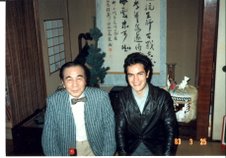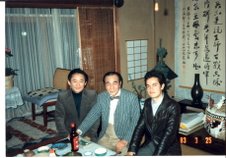Sunday 30 was the day of my departure, but not before the final event of the festival, a morning concert by the soloists from the Contemporary Vocal Ensemble of Indiana University. I had known their conductor, the excellent Carmen Téllez, from a distance, in her capacity as director of the Latin American Music Center at Indiana University. She came to Caracas with four young singers and her Indiana colleague David Dzubay, a composer. Dzubay provided what was by far the best piece in the programme, a richly textured setting of ee cummings for mezzosoprano and ensemble titled Life Songs, Book 1: dancesing in a green bay. Jacquelyn Matava gave a committed rendition with a well-directed group of young Venezuelan players, whose clarinettist struck me for her artistry and subtle pianissimos. A disturbing piece by Osvaldo Golijov, Tres canciones para soprano y orquesta de cámara, was superbly sung by Sharon Harms with an ensemble increased to the size of a chamber orchestra: technically accomplished, subtly expressive, rich in contrasts and the carrier of a powerful musical personality, this young singer proved a revelation. I am sure we will hear much about her before long.
The group of Latin American composers assembled in Caracas had by now dwindled to a handful, leaving rather fewer to say goodbye to: besides Paraskevaídis and Villanueva were left Darwin Aquino from Dominican Republic, Jorge Nunes from Brazil and Julio Racine from Haiti.
My final balance: Alfredo Rugeles and Diana Arismendi do a magnificent job keeping the festival alive in difficult financial circumstances. If this year is anything to go by, they work with vision and dedication, and they have the necessary connections abroad and in Venezuela, but the latter do not always deliver their side of the bargain. All the problems I witnessed were due to somebody higher up or lower down the structure of the country’s culture machinery not honouring their undertaking. Arismendi and Rugeles deserve nothing but praise and gratitude. I wish them well in future festivals, for they deserve to succeed.
Having read so much press about today’s Venezuela, the opportunity to see it for myself was valuable.
It was exhilarating to meet so many interesting, talented, articulate and creative individuals among both the locals and the visitors. I have a mental list of those who left the strongest impression, but I will not share it here for fear of hurting anyone who might read these lines - I suppose it is technically possible? - and find themselves unlisted. Ever the optimist, me.
My own participation was not my finest moment. The funereal silence that greeted my paper continues to flummox me; did I misjudge the tone? If so, were there clues for knowing so beforehand, and if so how could I miss them? I will never know. The shrinkage from three pieces of mine in the programme to one, and thence to one movement thereof, was unfortunate, especially because it presented an extremely partial image of my work, and one of an atypical part at that. My own introduction prior to the performance of the slow movement of Una música escondida was meant to help putting the piece in context, but a question later on by a shrewd member of the audience showed me I had muddled the last sentence to the point of unintelligibility. So there were mistakes here and there, but there is little point in apportioning blame; the facts are what they are, and they will be better some other time.
The main thing is I was there, meeting some of the most talented composers and musicians on the continent, hearing their music, breathing that atmosphere, seeing again that country for which I have respect and affection. I am grateful for the invitation and the splendid opportunity. I learned much.


